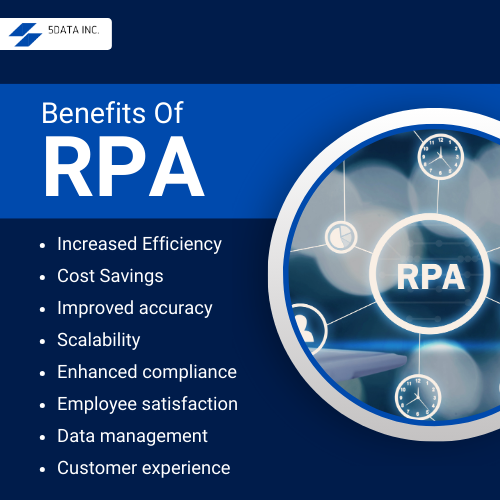Robotic Process Automation
Robotic Process Automation (RPA) is a technology designed to automate repetitive and rule-based tasks, allowing human resources to redirect their efforts toward higher-value activities. RPA leverages artificial intelligence (AI) and machine learning (ML) capabilities to automate routine, complex processes and standardized tasks, increasing productivity and efficiency.
Key Takeaways
- RPA automates rule-based tasks, boosting efficiency and accuracy.
- It reduces operational costs by minimizing human errors and labor expenses.
- Integration of AI enhances RPA capabilities, optimizing decision-making processes.
- Effective governance and monitoring are crucial for successful RPA implementation.
- Top RPA tools: Microsoft Power Automate, UiPath, Automation Anywhere, Blue Prism, WorkFusion.
Benefits Of RPA
RPA is an intelligent automation process that uses software robots to automate rule-based, repetitive tasks traditionally performed by humans. Here are some ways RPA can enhance business processes:
1. Increased Efficiency
RPA bots work faster than humans and can operate 24/7 without breaks, significantly increasing the speed and efficiency of business processes. RPA boosts operational efficiency by automating repetitive and rule-based tasks, reducing manual labor, and enhancing data entry accuracy. Using manual processes and automating mundane tasks, RPA saves resources that can be redirected to more valuable activities, saving time. Additionally, RPA empowers organizations to optimize processes, shorten cycle times, and increase productivity.
2. Cost Savings
By automating routine tasks, companies can reduce labor costs, enhance productivity, and minimize human errors that might lead to financial losses.
3. Improved accuracy
Software bots perform tasks accurately and reduce the risk of manual errors in data entry, payroll processing, and other mundane and repetitive tasks.
4. Scalability
RPA easily shifts operational costs up or down to match business needs, allowing companies to quickly respond to changes in demand.
5. Enhanced compliance
RPA ensures that tasks are completed in compliance with regulations, as bots follow predefined rules and maintain detailed logs of their activities.
6. Employee satisfaction
Automating mundane tasks frees employees to focus on more strategically rewarding work, which boosts productivity by increasing job satisfaction and productivity.
7. Data management
RPA can streamline data handling and document processing processes and enhance operational efficiency while ensuring consistent and reliable data collection, processing, and reporting.
8. Customer experience
Accurate customer satisfaction and faster processing of customer requests and transactions can improve customer satisfaction and loyalty.

Leveraging AI To Enhance RPA Solutions
The powerful integration of RPA and AI delivers numerous benefits: substantial cost and time savings, elevating employee satisfaction, and enhancing decision-making processes. AI enables RPA bots to comprehend the context of their actions, thereby facilitating intelligent process optimization. This dynamic amalgamation goes beyond task automation, propelling intelligent process optimization and unleashing unprecedented business agility. The best mobile application development services help businesses leverage and integrate artificial intelligence to benefit RPA.
Best Practices for Implementing RPA
Implementing RPA is crucial for maximizing efficiency in business operations by automating repetitive tasks. By automating rule-based tasks, RPA enables businesses to empower organizations to transform their business operations significantly. RPA is especially valuable for handling tasks that experience minimal changes over time, allowing human resources to focus on more intricate matters.
Implementing RPA requires careful planning, stakeholder buy-in, and continuous training. Following best practices for RPA implementation ensures seamless integration and optimal results. Ensuring effective governance and monitoring practices is essential for the long-term success of RPA initiatives. Identify suitable processes for automation (typically repetitive and rule-based) and choose the right RPA automation tools and vendors. Ensure robust governance and data security measures and provide training and support for employees to work alongside RPA. To successfully implement RPA, businesses should seek assistance from the best rapid application development company.
Top RPA Software On The Market
Several RPA software or tools are available today, revolutionizing how businesses operate. These automation solutions and tools automate repetitive tasks and processes, enhance accuracy and business efficiency, and improve employee productivity. Examples of top RPA software include Microsoft Power Automate, UiPath, Automation Anywhere, Blue Prism, and WorkFusion.
Overcoming Challenges
To achieve successful RPA adoption, investing in training and upskilling the workforce is crucial. Equipping employees with the knowledge and necessary skills to utilize RPA and automation tools is key to success. Implementing robust training programs and change management strategies under the supervision of a software application development company is vital in overcoming challenges. Additionally, establishing effective governance and monitoring practices is imperative for streamlining operations and ensuring the long-term success of RPA initiatives. Clearly defining roles and responsibilities, setting performance metrics and KPIs, and implementing regular monitoring and reporting mechanisms are crucial. By embracing these governance and monitoring practices, organizations can target areas for improvement, streamline processes, and guarantee the long-term viability of RPA benefits. Businesses can successfully integrate RPA by
a. Identifying suitable processes for automation
To ensure successful RPA implementation, carefully identifying processes suitable for automation solutions is essential. Addressing security and data privacy concerns is necessary to safeguard the integrity and unlock the efficiency of RPA initiatives. Smooth integration with existing IT infrastructure is also critical to ensuring the success of RPA endeavors.
b. Addressing security and data privacy concerns
When implementing RPA capabilities, it’s important to carefully address security and data privacy concerns to safeguard sensitive information. It involves identifying and reducing potential risks and vulnerabilities. By implementing strong security measures and data encryption protocols, we can ensure the integrity of our RPA initiatives and protect sensitive data..
Conclusion
Embracing the future of automation and leveraging RPA solutions to automate repetitive tasks are crucial steps for organizations aiming to enhance their operations. RPA has evolved as a transformative technology, offering many benefits, including operational optimization, increased efficiency, competitive edge, and exceptional customer experiences. By revolutionizing business operations and embracing RPA, organizations can unlock new efficiency, productivity, and competitive advantage levels in today’s dynamic business environment. RPA is a cornerstone for driving efficiency in business operations, and its continued adoption is expected to yield significant growth in the future.
Frequently Asked Questions
What types of tasks can RPA automate effectively?
RPA presents a highly dependable and precise approach to data processing and error reconciliation while also offering a decision support system that empowers users to make informed and effective decisions.
How does RPA increase efficiency?
The robot can replicate human actions, including entering data for analysis. Implementing this automation enhances operational efficiency and leads to cost reductions for companies. Time limitations constrain human performance, but innovative software like RPAP can operate continuously without interruptions. An RPA robot can accomplish tasks equivalent to the output of three to five years of human work.
How does robotic process automation help to automate business processes?
Intelligent RPA enhances the ease of bot development and offers non-coders greater flexibility in creating and executing applications. This technology encompasses an online studio and web-based low-code tools, streamlining automated building processes and incorporating visual programming capabilities for generating business process flows.
What is digital process automation (DPA)?
DPA leverages automation and digital technologies to optimize business processes, seamlessly orchestrating human resources and data systems to ensure efficient task completion. Distinguished by its advanced automation techniques, DPA also enables automated cognitive decision-making when needed. This approach is particularly beneficial for streamlining traditionally manual processes such as employee onboarding and training, resulting in significant time savings.

